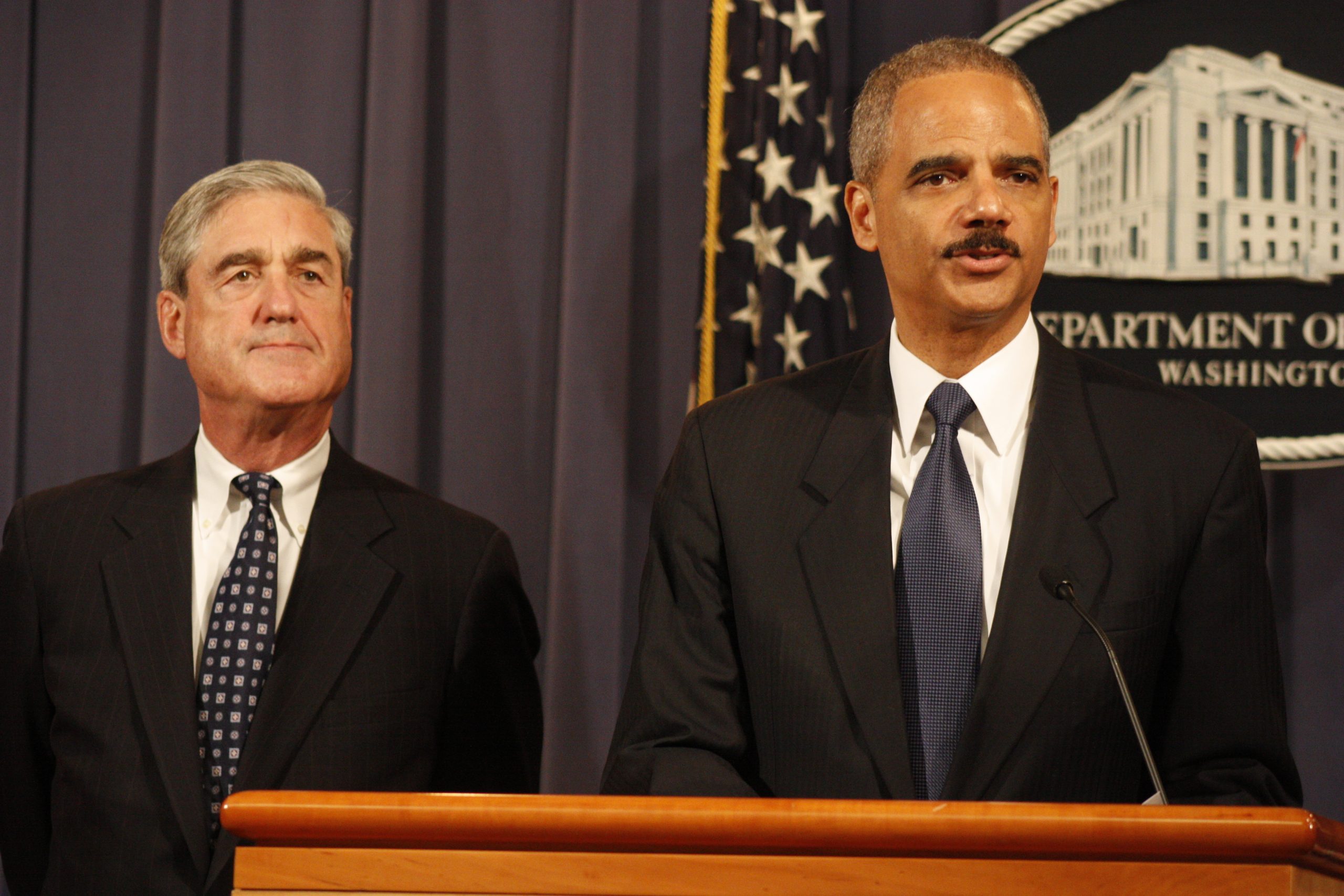Crime
Hackers Forcing ATMs To Spit Money Using Malware
Published
8 years agoon

(Via Zerohedge)
Hackers using sophisticated malware and an endoscope have been cracking into U.S. ATM machines, making them spit out cash like slot machines, according to security expert Brian Krebs – who reports that the U.S. Secret Service has been quietly warning financial institutions of the new wave of attacks in a confidential memo.
The practice known as “jackpotting” or “logical attacks,” first reported by ZeroHedge in 2014, has been widespread in Europe and Asia. Thieves typically target stand-alone ATMs such as those found in pharmacies, retail stores and gas stations, accessing the machine’s internals with an endoscope – a tiny camera on a flexible tube with which the hackers use to locate an internal port in the ATMs circuitry in order to connect a laptop and download malware. Another method used by hackers is to completely replace the ATMs hard drive with an identical one loaded with the malware.
Machines running Windows XP are particularly vulnerable, reads the Secret Service report, which recommends updating to Windows 7.
The malware, known as “Ploutus.D” then allows the hackers to remotely instruct the ATM to spit out cash. At present the hackers appear to be targeting Diebold Nixdorf machines – the #1 global ATM provider at around 35% of machines worldwide.
“Once this is complete, the ATM is controlled by the fraudsters and the ATM will appear Out of Service to potential customers,” reads the confidential Secret Service alert, as reported by Krebsonsecurity.com.
Barnaby Jack loading up an ATM for 2010 demonstration. Jack died in 2013
before he was to give a presentation on remotely hacking pacemakers and insulin pumps.
“In previous Ploutus.D attacks, the ATM continuously dispensed at a rate of 40 bills every 23 seconds,” the alert continues. Once the dispense cycle starts, the only way to stop it is to press cancel on the keypad. Otherwise, the machine is completely emptied of cash, according to the alert.
At a hacker conference in 2010, Wired reported, a researcher brought two infected ATMs to the stage and gave a demonstration.
In the first example, a volunteer from the audience swiped a card through the ATM, and the researcher instantly brought up his credit card number and personal information on a computer spreadsheet.
In the second, the researcher gave the machine a command. “Jackpot!!” flashed on the ATM’s screen, and it began spitting bills onto the floor as the crowd cheered. -WaPo
Crime
RICO in America: Trump’s Relentless Pursuit of George Soros and the Dawn of Political Racketeering Prosecutions
Published
4 months agoon
September 21, 2025
In a move that has electrified conservatives and sent shockwaves through globalist circles, President Donald J. Trump has greenlit a sweeping Racketeer Influenced and Corrupt Organizations (RICO) investigation targeting billionaire philanthropist George Soros and his sprawling network of nonprofits. Announced via a fiery Truth Social post on August 15, 2025—”Soros has been poisoning our democracy for decades. Time to RICO this clown and his puppets!”—the probe marks the first federal use of RICO statutes against a political financier, blending antitrust muscle with election interference claims. As indictments loom and allies rally, this saga isn’t just legal theater; it’s a blueprint for how America’s reopened playbook of accountability could reshape philanthropy, activism, and the deep state itself.
The Spark: From Campaign Rhetoric to DOJ Directive
Trump’s beef with Soros dates back to his first term, when he accused the Hungarian-born investor of bankrolling “paid protesters” during the 2016 transition and Charlottesville unrest. But post-2024 reelection, with a Republican trifecta in Congress and a DOJ loyal to his vision, rhetoric turned to action. The catalyst? A July 2025 whistleblower leak from the Open Society Foundations (OSF), Soros’ flagship, revealing $500 million funneled through shell entities to influence 2024 battleground states—allegedly including voter registration drives in Pennsylvania and Georgia that federal auditors later flagged as “irregular.”
On August 10, Attorney General Pam Bondi, a Trump stalwart, issued a sealed indictment under 18 U.S.C. § 1961 et seq., the RICO Act originally crafted to dismantle Mafia syndicates. The 127-page filing paints OSF and affiliates like the Tides Foundation as an “enterprise” engaging in a “pattern of racketeering activity” via wire fraud, money laundering, and conspiracy to subvert elections. Key allegations:
- Election Meddling as Extortion: Soros-linked PACs allegedly coerced tech firms (e.g., via $100 million to Media Matters) to suppress conservative voices, qualifying as “extortionate threats” under RICO.
- Foreign Influence Pipeline: Ties to EU grants and Hungarian expatriate networks funneled $200 million to U.S. DAs like Alvin Bragg and Larry Krasner, who pursued Trump cases—framed as a “bribe-for-prosecution” scheme.
- NGO Laundering: Over 300 entities, from Color of Change to the ACLU’s voting rights arm, received “dark money” rerouted through Cayman Islands trusts, evading IRS disclosure.
Trump, in a Mar-a-Lago presser, dubbed it “RICO for the globalists,” vowing to “claw back every crooked dime.” The DOJ’s task force, Operation Shadow Ledger, has subpoenaed 47 organizations, freezing $150 million in assets and raiding OSF’s New York offices on September 5—footage of agents carting servers went viral, amassing 50 million views.
Soros’ Empire Strikes Back: Denials, Lawsuits, and Diaspora Defenses
At 95, Soros—net worth $7.2 billion—remains defiant from his Bedford, New York estate. In a rare Bloomberg interview on August 20, he dismissed the probe as “authoritarian revenge,” likening it to Orban’s crackdown in Hungary. OSF’s statement called the charges “baseless smears designed to chill free speech,” filing a countersuit in federal court alleging First Amendment violations and selective prosecution. Soros’ son, Alex, who helms OSF, rallied allies: a coalition of 200+ NGOs penned an open letter to the UN, warning of “democratic backsliding.”
Legal experts are split. Harvard’s Laurence Tribe blasted it as “McCarthyism 2.0,” arguing RICO’s “enterprise” prong doesn’t fit ideological funding. But NYU’s Rachel Barkow, a former sentencing commissioner, concedes the case’s strength: “If prosecutors prove a coordinated pattern—like the 2020 election grants mirroring DNC strategies—it’s airtight.” Precedents abound: RICO felled the Gambino family in the ’80s and Enron execs in the 2000s, with civil provisions allowing triple damages—potentially bankrupting Soros’ web.
Internationally, blowback mounts. The EU Parliament condemned the “witch hunt” on September 10, while Hungary’s Viktor Orban toasted Trump with a Budapest billboard: “Finally, Justice for the Puppet Master.” Protests erupted in D.C., with Code Pink and Black Lives Matter decrying “fascist overreach,” met by MAGA counter-rallies chanting “Lock him up!”
The Bigger Play: RICO as Trump’s Weapon Against the “Swamp”
This isn’t isolated—it’s salvo one in Trump’s “Accountability Winter.” Parallel probes target ActBlue for “straw donor” schemes and the Ford Foundation for DEI grants deemed “anti-white discrimination.” House Judiciary Chair Jim Jordan, wielding subpoena power, hauled OSF execs before a September 12 hearing, where one exec invoked the Fifth amid leaked emails showing “Trump neutralization” strategies.
Critics fear a slippery slope: Could environmental groups face RICO for climate lobbying? Evangelical donors for abortion fights? Yet Trump allies like Stephen Miller frame it as leveling the field: “Soros spent billions unopposed; now we fight fire with law.” Polls show 62% GOP approval, per Rasmussen, with independents at 48%—a rare bipartisan hook on “big money in politics.”
As discovery unfolds—expected to unseal donor lists by October—whispers of plea deals swirl. Will mid-level operatives flip on Soros’ inner circle? The octogenarian himself faces no direct charges yet, but civil forfeiture could strip his influence. In Trump’s America, RICO isn’t just for mobsters; it’s the great equalizer, promising to audit the auditors and prosecute the philanthropists. Whether it endures Supreme Court scrutiny or crumbles under appeals, one truth endures: the hunter has become the hunted.
Crime
Antifa’s Reckoning: Trump’s Terrorist Designation Ignites a Nationwide Crackdown on Radical Left Networks
Published
4 months agoon
September 21, 2025
Just days after the assassination of conservative firebrand Charlie Kirk, President Donald J. Trump dropped a bombshell that has left the radical left reeling: the formal designation of Antifa as a “major terrorist organization.” Unveiled in a blistering Truth Social post on September 18—”Antifa is a sick, dangerous, radical left disaster that’s been terrorizing our cities for years. No more! We’re designating them a MAJOR TERRORIST ORGANIZATION effective immediately. Law enforcement: Hunt them down!”—the move signals the opening salvo in Trump’s promised war on domestic extremism. With echoes of the 2020 riots still fresh and Kirk’s killing pinned on a self-avowed Antifa sympathizer, the administration is wielding this label like a sledgehammer, blending executive fiat with congressional muscle to dismantle what Trump calls “the Bolshevik mob.” But as raids multiply and lawsuits fly, the question looms: Will this finally neuter Antifa’s decentralized chaos, or just martyr its black-clad foot soldiers?
The Announcement: From Campaign Promise to Executive Order
Trump’s antipathy toward Antifa isn’t new—he branded them a terror group during his first term amid the George Floyd protests, which saw over $2 billion in damages and dozens killed in Antifa-linked violence. But reelection in 2024, coupled with a GOP sweep, supercharged the rhetoric into reality. The trigger? Tyler Robinson, the 22-year-old suspect in Kirk’s slaying, whose manifesto railed against “fascist enablers” in classic Antifa jargon, complete with etched shell casings screaming “Smash the Patriarchy.”
On September 18, Trump bypassed the usual bureaucratic slog, issuing an executive order directing the DOJ and DHS to treat Antifa affiliates as domestic terrorists under the Patriot Act and expanded FISA provisions. No formal “listing” like foreign groups—Antifa’s leaderless, amorphous structure makes that tricky—but the order greenlights surveillance, asset freezes, and RICO charges against “coordinated actors.” Attorney General Pam Bondi, in a Fox News exclusive, elaborated: “This isn’t about ideology; it’s about violence. We’ve got 500 open cases from 2020 alone. Now, we prosecute as terror.”
Congress piled on: House Resolution 26, introduced January 2025 by Rep. Jim Jordan (R-OH), deems Antifa conduct “domestic terrorism” and passed the chamber 220-210 on September 19. Senate Majority Leader John Thune vows a vote next week, tying it to a $10 billion homeland security boost. Early wins? FBI raids in Portland and Seattle netted 15 “persons of interest,” seizing Molotov cocktails, bikes for ramming police, and encrypted chats plotting “direct action” against Trump rallies.
Legal Ramifications: RICO, Surveillance, and the Leaderless Loophole
Experts are buzzing over the designation’s teeth—or lack thereof. Unlike al-Qaeda, Antifa has no headquarters, no roster; it’s a “movement” of autonomous cells, funded by shadowy donors like the Tides Foundation (already under Soros scrutiny). Legal scholars like Hina Shamsi of the ACLU warn it’s “legally toothless,” arguing it risks First Amendment chills on protesters. “You can’t designate a tactic as a terrorist,” she told NPR, predicting court blocks akin to Trump’s 2017 travel ban.
Yet Trump’s team sees opportunity in the gray areas. The order invokes RICO statutes—fresh off the Soros playbook—to target funders and coordinators as an “enterprise.” Just The News reports DOJ eyeing charges against 2020 riot architects, with wire fraud and conspiracy predicates from interstate travel and crowdfunding. “Leaderless? Fine,” Bondi quipped. “We’ll RICO the enablers.” Implications cascade: Bank accounts frozen (already $5 million seized), no-fly lists for known agitators, and enhanced sentences—up to life for “terror acts.”
Antifa’s response? A defiant Rose City Antifa statement: “We’re not an org; we’re everywhere. Your labels won’t stop the resistance.” But cracks show: Internal leaks reveal infighting over “going dark,” with some cells disbanding amid doxxing fears.
Backlash and Defenses: From Street Protests to Elite Outrage
The left erupted. AOC tweeted, “This is McCarthyism on steroids—targeting dissent to protect fascism,” sparking #ResistTheLabel rallies in 20 cities, where masked marchers clashed with police, injuring 12. David Axelrod warned on CNN it’s a “playbook to target political enemies,” while Code Pink decried it as “warmongering against the anti-war left.” Protests tied to Kirk’s memorial turned ugly, with a thwarted Antifa plot in Orem, Utah, foiled by tipsters—earning Trump praise as “the people fighting back.”
Conservatives hail it as overdue. Andy Ngo, the journalist doxxed and beaten by Antifa in 2019, told Newsmax: “State Department should list them foreign too—their Euro roots run deep.” Polls show 58% approval (Rasmussen), with even 32% of Democrats viewing Antifa unfavorably post-Kirk. On X, MAGA voices demand KKK inclusion for “fairness,” per Scott Adams’ quip, while Rod Martin dissected Antifa’s Weimar-era origins on NTD News: “It’s not protest; it’s prelude to revolution.”
International Ripple: From Budapest to The Hague
The shockwaves crossed oceans. Hungary’s Viktor Orban, Trump’s ideological twin, designated Antifa a terror group on September 19, urging the EU: “Time to classify these anarchists.” The Dutch Parliament followed suit hours later, citing Kirk’s murder as a “wake-up call” to Europe’s radical left—Gateway Hispanic reports it as a domino effect from Trump’s example. Al Jazeera notes Brussels’ fury, with MEPs decrying “transatlantic authoritarianism,” but far-right gains in France and Italy cheer the precedent.
In the U.S., it dovetails with border crackdowns: DHS links Antifa to migrant caravans smuggling agitators, per leaked memos. Eurasia Review questions the “what ifs”—enhanced extraditions? Frozen global assets?—but one thing’s clear: Trump’s move has globalized the fight.
The Road Ahead: Enforcement or Overreach?
As Bondi assembles a “Terror Task Force” with 200 agents, whispers of overreach grow. Will it snag BLM allies or campus protesters? Trump’s retort: “Only the violent.” With midterms looming, this could rally the base—or backfire if courts neuter it. For now, Antifa’s street cred is battered, their mystique cracked. Kirk’s death lit the fuse; Trump’s designation is the explosion. In the battle for America’s soul, the radicals just lost their biggest shield.
Crime
Robert Mueller’s Health Prevents Testimony on Epstein
Published
4 months agoon
September 1, 2025
As of September 1, 2025, the decision to withdraw a subpoena for former Special Counsel Robert Mueller to testify before the House Oversight Committee has been met with a mixture of understanding and curiosity. Mueller, a respected figure who led the FBI from 2001 to 2013 and later investigated ties between the Trump campaign and Russia, has reportedly been diagnosed with Parkinson’s disease since the summer of 2021, according to his family’s statement. This health challenge, which has affected his speech and mobility in recent months, has understandably led to the committee’s decision to step back, allowing him the dignity to focus on his well-being. His decades of service to the nation, marked by integrity and dedication, deserve this respect, and many are hopeful for his comfort during this time.
The timing of this development, however, raises thoughtful questions among observers. Mueller was set to testify on September 2, 2025, as part of an investigation into the FBI’s handling of the Jeffrey Epstein case during his tenure, a topic that has stirred significant public interest and political scrutiny. The announcement of his health issues came just days before this scheduled appearance, following reports of his residence in a memory care facility and earlier concerns about his condition noted during his 2019 congressional testimony. While his family’s statement and the committee’s decision align with a genuine concern for his health, the coincidence with such a high-stakes inquiry prompts a cautious wonder about whether external pressures might have influenced the narrative, though no evidence suggests this outright.
This moment invites a balanced reflection on Mueller’s legacy and the ongoing pursuit of truth. His inability to testify, while a personal loss for those eager to hear his perspective, underscores the human side of public service, where age and health can impose limits. Yet, the abrupt nature of the withdrawal, paired with the gravity of the Epstein probe, leaves room for speculation about the full context. As the investigation continues with other witnesses, the focus remains on uncovering facts, with respect for Mueller’s past contributions tempered by a gentle skepticism about the timing, encouraging a thorough and transparent process moving forward.

RICO in Iowa: Cedar Rapids Lead Map Breaks EPA Rules?

Public Statement from Kristin Mitchell

Cedar Rapids Wins AWWA ‘Best-Tasting Water’ Prize, 17% Face Lead Risks — AWWA Sues EPA Over Lead Regulations

RICO in Iowa: Watch the Water Cedar Rapids





